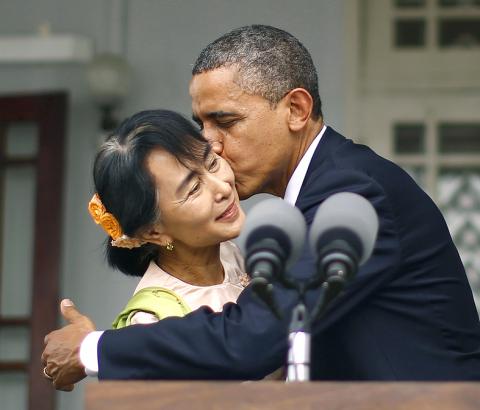US President Barack Obama urged Myanmar yesterday to hasten its “remarkable” reforms on a historic visit during which he was feted by huge crowds and met democracy icon Aung San Suu Kyi at the home where she was long locked up.
The trip, the first to Myanmar by a serving US president, came as the country’s regime freed dozens more political prisoners to burnish its reform credentials and after the US joined other Western powers in relaxing its sanctions.
After a red-carpet welcome for Air Force One, Obama met Myanmar’s reformist President Thein Sein and called on the former general to speed up the country’s march out of decades of iron-fisted military rule.

Photo: Reuters
“Over the last year and a half, a dramatic transition has begun, as a dictatorship of five decades has loosened its grip,” Obama said afterwards in a major address at Yangon University during his visit.
“This remarkable journey has just begun, and has much further to go,” he said. “The flickers of progress that we have seen must not be extinguished. They must be strengthened.”
Over the past few decades, “our two countries became strangers, but today, I can tell you that we always remained hopeful about the people of this country,” Obama said. “About you. You gave us hope. And we bore witness to your courage.”
In once unthinkable scenes, Obama’s motorcade passed tens of thousands of flag-waving supporters — some chanting: “America” — lining the streets of Yangon, the backdrop for several bloody crackdowns on pro-democracy uprisings.
Obama removed his shoes during a brief visit to Shwedagon Pagoda, a gold-plated spire encrusted with diamonds and rubies that is the spiritual center of Burmese Buddhism. He later stood side by side with Aung San Suu Kyi at the lakeside villa where his fellow Nobel laureate languished for years under house arrest, as the presidential limousine sat parked outside.
Crowds could be heard chanting: “Obama, freedom” in the streets nearby.
Aung San Suu Kyi for her part sounded a note of caution about the sweeping changes.
“The most difficult time in any transition is when we think that success is in sight,” she said. “We have to be very careful that we’re not lured by the mirage of success.”
The White House hopes Obama’s visit to Myanmar will strengthen Thein Sein’s reform drive, which saw Aung San Suu Kyi enter parliament after the junta made way for a nominally civilian government.
The trip is seen as a political coup for Obama after his election victory and a major boost for Thein Sein, who has faced resistance from hardliners within his regime to the rapid political changes.
Obama has stressed his visit is not an “endorsement” of the regime but “an acknowledgement” of the reform process.
Some human rights groups said Obama should have waited longer to visit, saying that he could have dangled the prospect of a trip as leverage to seek more progress such as the release of scores of remaining political prisoners.

The CIA has a message for Chinese government officials worried about their place in Chinese President Xi Jinping’s (習近平) government: Come work with us. The agency released two Mandarin-language videos on social media on Thursday inviting disgruntled officials to contact the CIA. The recruitment videos posted on YouTube and X racked up more than 5 million views combined in their first day. The outreach comes as CIA Director John Ratcliffe has vowed to boost the agency’s use of intelligence from human sources and its focus on China, which has recently targeted US officials with its own espionage operations. The videos are “aimed at

STEADFAST FRIEND: The bills encourage increased Taiwan-US engagement and address China’s distortion of UN Resolution 2758 to isolate Taiwan internationally The Presidential Office yesterday thanked the US House of Representatives for unanimously passing two Taiwan-related bills highlighting its solid support for Taiwan’s democracy and global participation, and for deepening bilateral relations. One of the bills, the Taiwan Assurance Implementation Act, requires the US Department of State to periodically review its guidelines for engagement with Taiwan, and report to the US Congress on the guidelines and plans to lift self-imposed limitations on US-Taiwan engagement. The other bill is the Taiwan International Solidarity Act, which clarifies that UN Resolution 2758 does not address the issue of the representation of Taiwan or its people in

US Indo-Pacific Commander Admiral Samuel Paparo on Friday expressed concern over the rate at which China is diversifying its military exercises, the Financial Times (FT) reported on Saturday. “The rates of change on the depth and breadth of their exercises is the one non-linear effect that I’ve seen in the last year that wakes me up at night or keeps me up at night,” Paparo was quoted by FT as saying while attending the annual Sedona Forum at the McCain Institute in Arizona. Paparo also expressed concern over the speed with which China was expanding its military. While the US

SHIFT: Taiwan’s better-than-expected first-quarter GDP and signs of weakness in the US have driven global capital back to emerging markets, the central bank head said The central bank yesterday blamed market speculation for the steep rise in the local currency, and urged exporters and financial institutions to stay calm and stop panic sell-offs to avoid hurting their own profitability. The nation’s top monetary policymaker said that it would step in, if necessary, to maintain order and stability in the foreign exchange market. The remarks came as the NT dollar yesterday closed up NT$0.919 to NT$30.145 against the US dollar in Taipei trading, after rising as high as NT$29.59 in intraday trading. The local currency has surged 5.85 percent against the greenback over the past two sessions, central